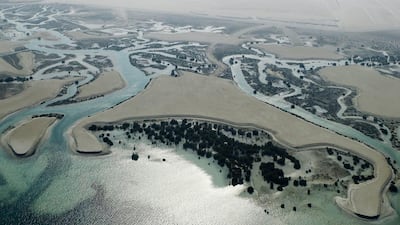ABU DHABI // Environment experts say they have made provisions for the possible harm that climate change could cause to the coastline.
The Intergovernmental Panel on Climate Change said last week global warming could pose risks to marine habitats such as mangrove swamps and coral reefs in the UAE and the wider Arabian Gulf.
Dr Thabit Al Abdessalaam, a senior adviser on biodiversiy at the Environment Agency Abu Dhabi, said that rather than presenting new information the panel’s warning had reinforced the significance of climate change.
“It also emphasises the need for joint and concerted efforts to address and implement priorities aimed at mitigating climate change and adapting to its impacts,” he said.
“The Government is cognisant of the potential of climate change to pose serious adverse impacts on Abu Dhabi emirate and the UAE’s environment, its people and their safety and livelihood.
“The development of joint plans at the emirate of Abu Dhabi and federal levels, which are striving to take into account local, regional and international drivers and agreements, is a testimony to the government’s understanding of the significance of the matter and the need to ensure that climate change issues are addressed as a matter of national priority.”
The environment agency has made climate change a high priority in its five-year strategic plan, he said. Last year the agency established a greenhouse gas inventory for Abu Dhabi and it is undertaking studies into the possibility for the emirate’s ecosystems and sensitive land areas to adapt to changes in climate.
“Climate change mitigation requires broad cross-sector coordination instead of isolated interventions of individual organisations. As the leading public agency for protecting and conserving the environment in Abu Dhabi, EAD has a key role to play in managing a concerted response to mitigate climate change at the local level through a combination of supply and demand side management initiatives,” he said.
The latest report from the intergovernmental panel details the current and future impact of climate change on different global regions.
Coastal and marine eco-systems in Asia are already under pressure from different factors and the stress is likely to increase as the amount of heat-trapping greenhouse gases in the atmosphere increases.
“Mangroves, salt marshes and seagrass beds may decline unless they can move inland, while coastal freshwater swamps and marshes will be vulnerable to saltwater intrusion with rising sea-levels,” said the report.
“Widespread damage to coral reefs correlated with episodes of high sea-surface temperature has been reported in recent decades and there is high confidence that damage to reefs will increase during the 21st century as a result of both warming and ocean acidification.”
Besides warning over warmer subtropical and tropical waters that will likely be less rich in terms of biodiversity, the report is also urging for more studies into how climate change will affect rain patterns and the availability of water in many parts of Asia.
“Improved projections for precipitation, and thus water supply, are most urgently needed,” it said. “Another priority is developing water management strategies for adaptation to changes in demand and supply.”
Another area where knowledge is lacking is in understanding the effects of climate change on biodiversity. In many countries in the region, scientific baseline information is either lacking or limited, the report warned.
vtodorova@thenational.ae

